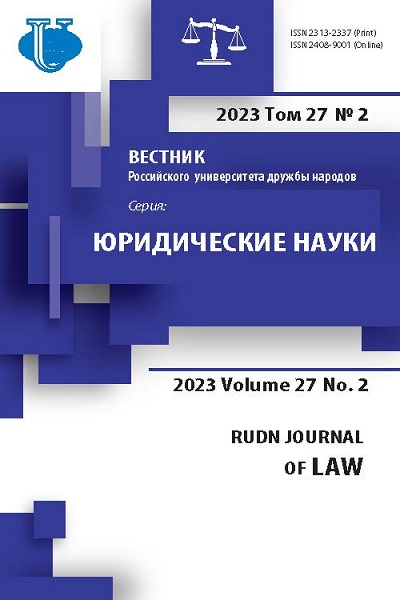Delegated rulemaking by the Central Election Commission of Russia
- Authors: Lopatin A.I.1, Malkarov A.I.2
-
Affiliations:
- Central Election Commission of the Russian Federation
- Ministry of Justice of the Russian Federation
- Issue: Vol 27, No 2 (2023)
- Pages: 338-353
- Section: CONSTITUTIONAL AND MUNICIPAL LAW
- URL: https://journals.rudn.ru/law/article/view/35028
- DOI: https://doi.org/10.22363/2313-2337-2023-27-2-338-353
- EDN: https://elibrary.ru/RUAJLK
- ID: 35028
Cite item
Full Text
Abstract
The issue of systematization of legislation is quite relevant and the task of solving it is part of the state legal policy. At the same time, the solution of the above problem is impossible in isolation from the study of a number of issues affecting both the theoretical and practical aspects of lawmaking and law enforcement activities. For example, one of these key issues is the hierarchy of normative legal acts, including those issued by state bodies of the Russian Federation. The issue of standard-setting powers of certain state bodies is quite controversial. The article investigates the practice of implementing the institution of delegated legislation in the Russian Federation on the example of the practice of delegated rulemaking of the Central Election Commission (CEC) of Russia. The study consistently considers issues of the constitutional and legal status of the Central Election Commission of the Russian Federation, including regulatory powers related to it. Various points of view relevant to the scientific community on this issue have been outlined. At the same time, the authors proceed from understanding that rulemaking powers are integral attribute properties of the constitutional and legal status of the CEC of Russia. Based on the tasks set, the issues of the forms of regulatory legal acts of the CEC of Russia as sources of constitutional law are investigated. The authors indicate the need to diversify acts issued by the CEC of Russia within the framework of exercising its direct powers, with acts issued within the framework of delegated rulemaking. In this regard, special attention is paid to legal regulation regarding the new electoral procedure - remote electronic voting. Given the enormous importance for the state and its obligation to ensure transparency and legitimacy in electoral procedures, it is clear that their legislative regulation should be adequate to the level of tasks to be solved. At the same time, the authors believe that acts of delegated rulemaking, subject to certain restrictions and requirements, meet the specified characteristics. The methodological basis of the study includes the dialectical method, methods of analysis, synthesis and analogy, as well as formal-legal and comparative legal methods.
About the authors
Anton I. Lopatin
Central Election Commission of the Russian Federation
Author for correspondence.
Email: lopatin@cikrf.ru
Member of the Central Election Commission of the Russian Federation 9 Bol’shoyCherkassky Pereulok, Moscow, 109012, Russian Federation
Akhmat I. Malkarov
Ministry of Justice of the Russian Federation
Email: akhmat.malkarov@yandex.ru
Candidate of Legal Sciences, Leading Adviser of the Control and Audit Department, the Department of Organization and Control 1 build. 14 Zhitnaya str., Moscow, 119991, Russian Federation
References
- Artemova, O.E. & Romanovskaya, O.V. (2017) Constitutional and legal status of the Central Election Commission of the Russian Federation: monograph. Moscow, Prospect Publ. (in Russian).
- Chervonuk, V.I. & Yakadin, D.D. (2014) Delegation of legislative powers as a kind of legal procedure (comparative law context). Vestnik Saratovskoi gosudarstvennoi yuridicheskoi akademii. 3(98), 180-187. (in Russian).
- Chistoborodov, I.G. (2016) Russian central election commission as main subject of public administration by electoral process. Gaps in Russian Legislation. (2), 8-12. (in Russian).
- Churov, V.E., & Ebzeev, B.S. (2011) Democracy and management of the electoral process: domestic model. Journal of Russian law. 11(179), 5-20. (in Russian).
- David, R. (1988) Basic legal systems of our time. Transl. from French and introduction by Tumanov V.A. Moscow, Progress Publ. (in Russian).
- Dogadailo, E.Yu. & Gorlachev, R.Yu. (2018) On the Concept and Significant Attributes of a statutory act in the Russian Federation. State Power and Local Self-government. (10), 56-62. https://doi.org/10.18572/1813-1247-2018-10-56-62 (in Russian).
- Ebzeev, B.S. et al. (2017) Suffrage: textbook. Moscow, UNITI-DANA. (in Russian).
- Ebzeev, B.S. (2019a) “Hard” and “soft” law in the constitutional order of Russia (New meanings in understanding the sources of law). State and Law. (12), 26-38. (in Russian).
- Ebzeev, B.S. (2019b) Constitutional law of Russia: textbook. Moscow, Prospect Publ. (in Russian).
- Klishas, A.A. (ed.). (2019) Theory of State and Law: Textbook. Peoples' Friendship University of Russia, Law Institute. Moscow, Statute Publ. (in Russian).
- Kolyushin, E.I. (2022) The problem of quasi-supremacy of law in electoral law. Constitutional and Municipal Law. (6), 51-56. https://doi.org/10.18572/1812-3767-2022-6-51-56 (in Russian).
- Kutafin, O.E. (2014) Selected works: in 7 vol-s. Vol. 2. Sources of constitutional law: monograph. Moscow, Prospekt Publ. (in Russian).
- Luchin, I.N., Ebzeev, B.S. & Khazov, E.N. et al. (2019) Constitutional law of Russia. 10th ed., reprint. and supplemented. Moscow, Unity-Dana Publ. (in Russian).
- Osavelyuk, A.M. (2017) On the issue of the system of state bodies in Russia. Law and State: The Theory and Practice. 2(146), 113-117. (in Russian).
- Postnikov, A.E. (2022) On the limits of the bylaw regulation of citizens’ electoral rights. Journal of Russian Law. 5(26), 31-42. https://doi.org/10.12737/jrl.2022.050 (in Russian).
Supplementary files















